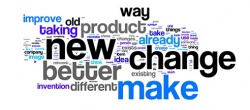Change is constant, and in today’s hyper-paced society, possibly even expected according to a recent study conducted by Ipsos. North Americans are embracing change, looking for new opportunities, improvements and differentiation.
In fact, over half (55%) of North Americans admit to having reinvented themselves, and another 21% plan to reinvent themselves in the future. Millennials (85%) and females (77%) tend to be more open to the idea of reinvention when compared to older generations (79%, Generation X; 65%, Baby Boomers) and males (74%).
“People are continually making changes in their lives,” says Steve Levy, Chief Operating Officer with Ipsos in Canada. “The degree to which people change varies across age groups and genders. It’s particularly interesting to see that younger generations are much more open to reinvention than their older counterparts.”
The study reveals that there are many different angles to personal reinvention. In fact, 27 types of reinvention were grouped into eight categories. The categories (and percentage of consumers who have made a change in each area) are health and wellness (88%), life-stage changes (78%), attitude changes (73%), experience/involvement changes (71%), career changes (59%), personal/physical changes (57%), location changes (54%) and gender identity (24%). Clearly, reinvention is not confined to a certain stage of life; indeed, it covers the gamut of life experiences.
Despite the fact that many North Americans have, or will, reinvent themselves, it is not easy to achieve. In fact, more than two-thirds (68%) of North Americans reveal that reinvention is a tough thing to do and that some reinventions are more difficult to achieve than others. To understand this further Ipsos created a reinvention ‘Difficulty Index’. In this index, 100 represents Average Difficultly; an index score of 120 or above is deemed Difficult, scores of 80-119 represent Average Difficulty and less than 80 are considered Easy. This analysis shows that the toughest changes to make include: parting ways with someone, dealing with health issues concerning yourself or someone close to you, losing weight, getting into shape and making an attitude or general outlook change.
Still, even with this perceived difficulty, consumers truly believe in reinvention. When examining the extent to which people believe they should reinvent themselves, the vast majority (72%) think that individuals must continually reinvent to improve.
“Even if consumers aren’t specifically admitting to reinvention, the results show that they are still making important changes in their lives,” adds Levy. “This transfers over to their expectations of brands, too. Companies need to continually pay attention to how consumers reinvent themselves, and adapt their offering to stay relevant and deliver on these evolving needs and desires.”
Source: Ipsos










